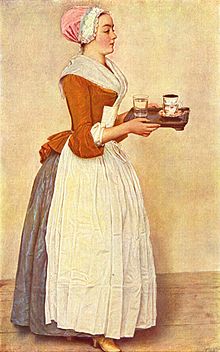- Rosemary Lane (song)
-
Rosemary Lane is an English folksong: a ballad that tells a story about the seduction of a domestic servant by a sailor. This song, and the related sea shanty Bell Bottom Trousers, are Roud #269.
Contents
Synopsis
One variant of the song begins with the words:
When I was in service in Rosemary Lane
I won the good will of my master and dame
Until a young sailor came there to stay
And that was the beginning of my misery.The sailor seduces the servant and makes grand promises of money as he departs, but in fact he leaves her pregnant and alone to ponder her child's future:
Now if it’s a boy, he’ll fight for the King,
And if it’s a girl she’ll wear a gold ring;
She’ll wear a gold ring and a dress all aflame
And remember my service in Rosemary Lane.[1]Variants and adaptations
Variants
Variants of the song exist under titles including Once When I Was a Servant, Ambletown, The Oak and the Ash, Home, Dearie, Home, The Lass that Loved a Sailor, and When I was Young.[2][1] The song first was attested in a broadside ballad dating to between 1809 and 1815.[1] The textual history is complex, and verses have been added freely to versions of this song or borrowed into songs circulated under other titles by oral tradition.[2]
- Some variants make the sailor a "bold sea captain".[3]
- The variants Home, Dear Home (or Home, Dearie, Home) and The Oak and the Ash include an additional refrain, from which these versions take their name:
- Home, dear home, and it's home we must be,
- Home, dear home, to my dear country,
- Where the oak and the ash, and the bonny birken tree
- They are all growing green in my own country.[4]
- Although the variant Ambletown changes the song's perspective to a narration of a letter informing a sailor that he has fathered a child, many lyrics, including the verse "If he's a boy, he'll fight for the king[ ...]", remain constant.[2]
- The song's lyrics are occasionally set to the tune of Rock-a-bye Baby.[5]
Adaptations
- William E. Henley used portions of the text of this cluster of folksongs for his poem "O Falmouth Is a Fine Town":[2]
- For it's home, dearie, home — it's home I want to be.
- Our topsails are hoisted, and we'll away to sea.
- O, the oak and the ash and the bonnie birken tree
- They're all growing green in the old countrie.
- [. . .]
- O, if it be a lass, she shall wear a golden ring;
- And if it be a lad, he shall fight for his king:
- With his dirk and his hat and his little jacket blue
- He shall walk the quarter-deck as his daddie used to do.[6]
- Bell Bottom Trousers, a sea-shanty adaptation of the song, shares the basic plot, though the variant in question turns the tone from wistful regret to bawdiness:
- If you have a daughter, bounce her on your knee,
- And if you have a son, send the bastard out to sea!
-
- The United States Army's 10th Mountain Division further adapted Bell Bottom Trousers for a mountain-village setting (e.g., "I was a barmaid in a mountain inn..." and "...and if you have a son, send the bastard off to ski"), in the process borrowing Falmouth's "as his daddie used to do" theme. The result, titled Ninety Pounds of Rucksack, became the 10th Mountain's official marching/drinking song.[7]
Performances
Performers who have recorded this song or one of its variants include Anne Briggs, Liam Clancy, Chris Willett[2], Bert Jansch[8], and Espers[9].
References
- ^ a b c The Servant of Rosemary Lane at folkinfo.org; accessed Mar. 22, 2009.
- ^ a b c d e Robert B. Waltz and David G. Engle, The Ballad Index at California State University, Fresno, accessed Mar. 22, 2009
- ^ Ballads Catalogue: Harding B 26(347), Bodleian Library, Oxford University, ca. 1846 - 1852; accessed Mar. 23, 2009
- ^ Ballads Catalogue: Harding B 17(130a), Bodleian Library, Oxford University
- ^ folkinfo.org, from Purslow, F, (1968), The Wanton Seed, EDFS, London
- ^ William Ernest Henley, O Falmouth is a Fine Town
- ^ http://www.wildsnow.com/articles/trooper_traverse/90-lbs_of_rucksack.html
- ^ Rosemary Lane, sound recording
- ^ The Weed Tree, sound recording
Categories:- English folk songs
- Traditional ballads
Wikimedia Foundation. 2010.

